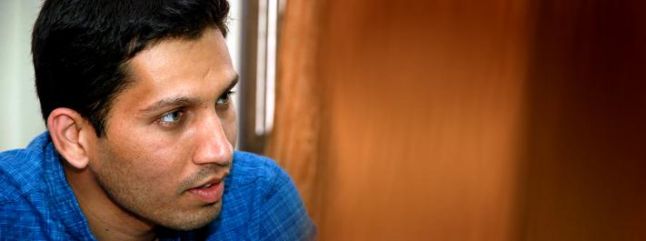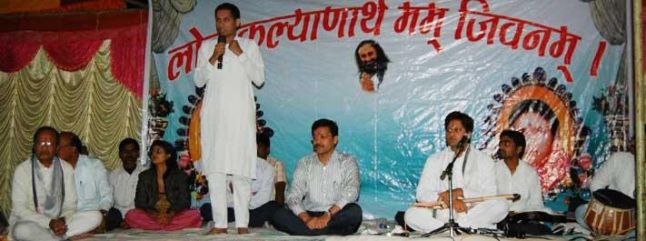He owes his positivity to his spirituality, so much so that he feels that his political path has been a spiritual experience. Indeed some of the best politicians in India have had strong spiritual connections.
Balasaheb Darade, is a faculty member of the Art of Living Foundation. He also has a NASA participation certificate for working on the Mars Rover and Deep Impact Mission, holds masters degree in nanotechnology from the University of Cincinnati, and was an entrepreneur in the U.S.A, returned to India last year to work for his country.
Armed with the experience of working as a core member of the India Against Corruption Movement (he lead a team in Cincinnati) and his own rural development project titled “Shankara”, Balasaheb stood for the Zilla Parishath elections in February (2012) and won over 50 % of the votes (he won 4087 votes).
“That’s the highest ever margin for an independent candidate in Maharashtra,” he points out.
“If you ask me why I stood for the Zilla Parishath elections, instead of the Legislative or General Elections, it’s because that’s the most ignored and underutilized post. Yet it is important for rural development. I wanted to set an example on how to effectively use this mechanism.”
“His Holiness Gurudev Sri Sri Ravi Shankar is one of my biggest inspirations. And my spiritual practices keep me calm and positive. Whatever the situation maybe, I’m always energetic,” he explains.
His goal as a district counselor is to develop his constituency, the Pangra Dole constituency in Maharashtra’s Buldana district located in the Vidarbha region.
“The problem with politics is that power becomes the goal. That’s when people become corrupt.”
So Balasaheb’s goal is to put in place the “Shankara Rural Project” for rural development.
“But before that, I want to ensure the implementation of all the government schemes. I have also noticed that the government funds for the district don’t reach the right people. My priority is to create awareness about the funds so that they reach the right people.”
He argues that people in the country know what their problems are, they even know the solutions to their problems. But what they lack is leadership, direction and the hope that change is possible.
“That’s one of the reasons I entered politics. I realized that more than a social movement, the country needs a political revolution. There is huge potential for the youth. Everybody wants change, but nobody steps forward. India is a country of talented people, and followers. Any discussion I took part in boiled down to politics. So I decided to do something about it.”
His slogan, “Ata badal Nischit” or “Change is certain” conveyed his conviction. And his clean politics pushed him straight through the line.
“People needed a change in leadership, when they saw me, they saw the change. I was educated, I had worked abroad and I reached out to them. I did not employ money or muscle power or distribute liquor. I didn’t even ask for votes. It was just pure intention and honesty.”
Most would say that in a country like India, political parties rule the roost, Balasaheb thinks otherwise.
“If you have clarity and your goal is development, then there is no issue. Plus, I grew up here, so I could connect with people. When there is heart-to-heart communication people will respond. They had already lost confidence in all the parties.”
He has no plans to join any party since there is a mis-match of principles. But he does not rule out the possibility of starting his own.
He also confesses to have had a surprisingly smooth sailing in his path.
“The first barrier is in one’s own mind and I had no problems with that. But there was a lot of initial opposition from my family because they believe that nothing can change. Yet I was convinced about my ideas. There are definitely a few obstacles but I feel so positive that I don’t notice them.”
He regularly consults Poojya Gurudev Sri Sri Ravi Shankarji and has sought guidance from other leaders like A.P.J.Abdul Kalam and Dr.Jaiprakash Narain.
“Politics is not all bad. I wonder why people never think of Krishna, Gandhiji or Shivaji, through they were some of the best politicians,” he quips.
“My appeal to youngsters is to take active part in democracy and be a part of the solution. If I can do this in a constituency located in the Vidarbha region, then anybody can. Change is on the way, all they have to do is take one step.”
He is quite clear about his solution, in the “Shankara Rural Project” and youth empowerment programs.
“First we study all the technical models for the village. Then we start creating leaders within the village. Next we create open, collaborative platforms where groups of youth study model villages and meet leaders like Anna Hazare. We will give them presentations on the existing government schemes, the resources that industries and NGOs can provide.”
He feels that this way they get to identify the problems and since they know that resources are available, they can make a road map with a timeline for their village.
“We will be facilitators and we will be using innovative techniques for communication, like keeping suggestion boxes where people can drop their problems and using an SMS system. We will also have sorting mechanisms, so this way we can effectively serve people.”
He has a strong message to deliver: “Democracy is alive and good people can win.”
If you like the story please write to us at webteam.india@artofliving.org
Writer: Harshini Vakkalanka, Graphics: Niladri Dutta & Gurudatt Anveker

